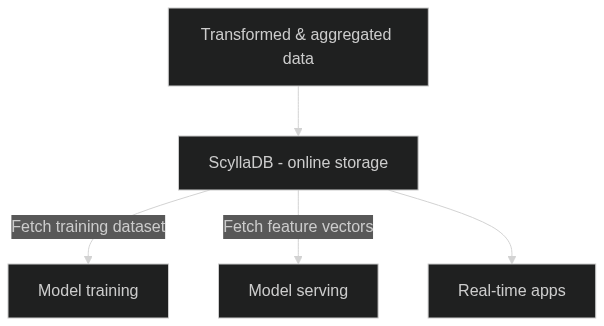This repository is based on this existing Feast sample application.
This sample project is a real-time credit scoring application example that shows you how to set up Feast with ScyllaDB Cloud as an online store and parquet files as offline store.
Feature store is a central data store to power operational machine learning models. They help you store transformed feature values in a scalable and performant database. Real-time inference requires features to be returned to applications with low latency at scale. This is where ScyllaDB can play a crucial role in your machine learning infrastructure.
ScyllaDB is a real-time NoSQL database that is best suited for feature store use cases where you require low latency (e.g. model serving), high throughout (e.g. training) and need peta-byte scalability.
- Low-latency: ScyllaDB can provide <1 ms P99 latency. For real-time machine learning apps, an online feature store is required to meet strict latency requirements. ScyllaDB is an excellent choice for an online store (Read how Medium is using ScyllaDB as a feature store.)
- High-throughput: Training requires querying huge amounts of data and processing large datasets with possibly millions of operations per second - something that ScyllaDB excels at.
- Large-scale: ScyllaDB can handle petabytes of data while still keeping latency low and predictable.
- High availability: ScyllaDB is a highly available database. With its distributed architecture, ScyllaDB keeps your feature store database always up and running.
- Easy to migration: ScyllaDB is compatible with DynamoDB API and Cassandra which means it's simple to migrate over from legacy solutions.
- Integration with Feast: ScyllaDB integrates with the popular open-source feature store framework, Feast.
- Python 3
- ScyllaDB Cloud account
Clone the repository:
git clone https://github.com/zseta/scylladb-feast
cd scylladb-feast
Project details:
- The primary training dataset is in
loan_table.parquet. This file contains historic loan data with accompanying features. The dataset also contains a target variable, namely whether a user has defaulted on their loan. - Feast is used during training to enrich the loan table with
zipcodeandcredit historyfeatures from other parquet files. - Feast is also used to serve the latest
zipcodeandcredit historyfeatures for online credit scoring using ScyllaDB Cloud.
In this tutorial, you'll do the following steps:
- Create a new ScyllaDB Cloud cluster
- Create a new keyspace for the feature store
- Install dependencies and configure Feast
- Deploy and test the feature store
Go to ScyllaDB Cloud and create a new cluster (either "Free Tial" or "Dedicated VM"). You can use the smallest available machine for this sample app (t3.micro)

Install CQLSH command line tool and connect to the ScyllaDB cluster:
pip install cqlsh
cqlsh <SCYLLA-CLOUD-HOST> -u scylla -p <PASSWORD>
You can get the host address, username, and password from your ScyllaDB Cloud dashboard:

Create a new keyspace called feast in ScyllaDB (this keyspace will be populated by Feast):
CREATE KEYSPACE feast WITH replication = {'class': 'NetworkTopologyStrategy', 'replication_factor': '3'} ;
Create a new Python environment and install dependencies:
virtualenv env && source env/bin/activate
pip install -r requirements.txt
Next, configure ScyllaDB Cloud as the online store for Feast.
Tip
ScyllaDB is compatible with Apache Cassandra so you can use the Feast Cassandra connector with ScyllaDB
Open the feature_store.yaml file and add the host addresses, username (scylla), and password for ScyllaDB:
project: repo
# By default, the registry is a file (but can be turned into a more scalable SQL-backed registry)
registry: data/registry.db
# The provider primarily specifies default offline / online stores & storing the registry in a given cloud
provider: local
online_store:
type: cassandra
hosts:
- x.x.x.x
- x.x.x.x
- x.x.x.x
username: scylla
password: pass
keyspace: feast
entity_key_serialization_version: 2You can get these values from the ScyllaDB Cloud dashboard.
Deploy the feature store by running apply from within the feature_repo/ folder
cd feature_repo/
feast apply
Deploying infrastructure for credit_history
Deploying infrastructure for zipcode_features
This commmand also generates a registry.db file in your data/ folder containing Feast configuration information.
Next, load features into the online store using the materialize-incremental command. This command loads the
latest feature values from a data source (parquet files, in our case) into the online store (ScyllaDB).
CURRENT_TIME=$(date -u +"%Y-%m-%dT%H:%M:%S")
feast materialize-incremental $CURRENT_TIME
The loading process starts:
35%|███████████████████▋ | 9965/28844 [01:20<02:39, 118.37it/s]
When it's completed, train the model using run.py (in the root folder of the repository)
cd ..
python run.py
The script returns the result of a single loan application:
Loan rejected!
You can also run feast ui to explore your features:
feast ui
Open http://0.0.0.0:8888

Run the Streamlit app locally:
streamlit run app.py
Go to http://localhost:8501
You can modify the variables on the left sidebar then the app will automatically run the prediction using the model.


